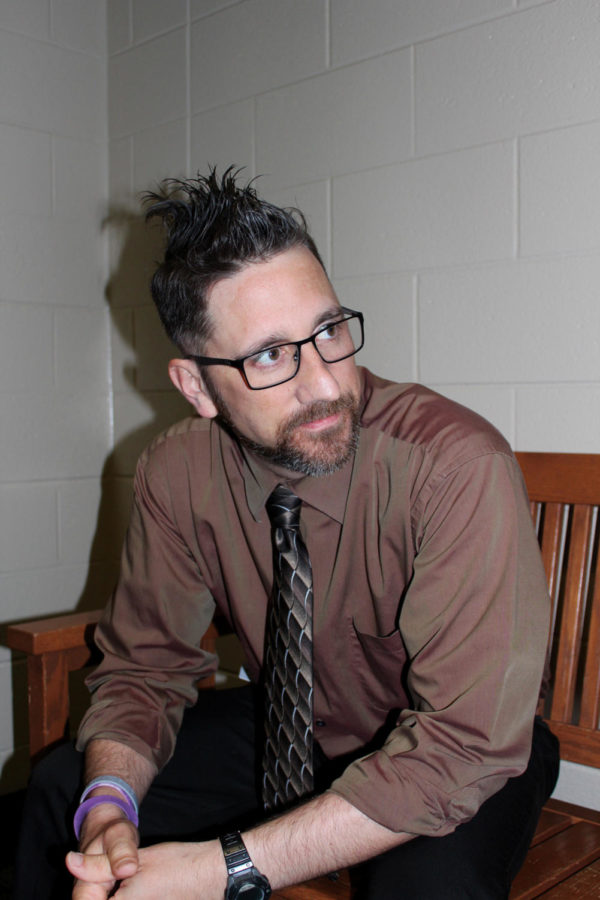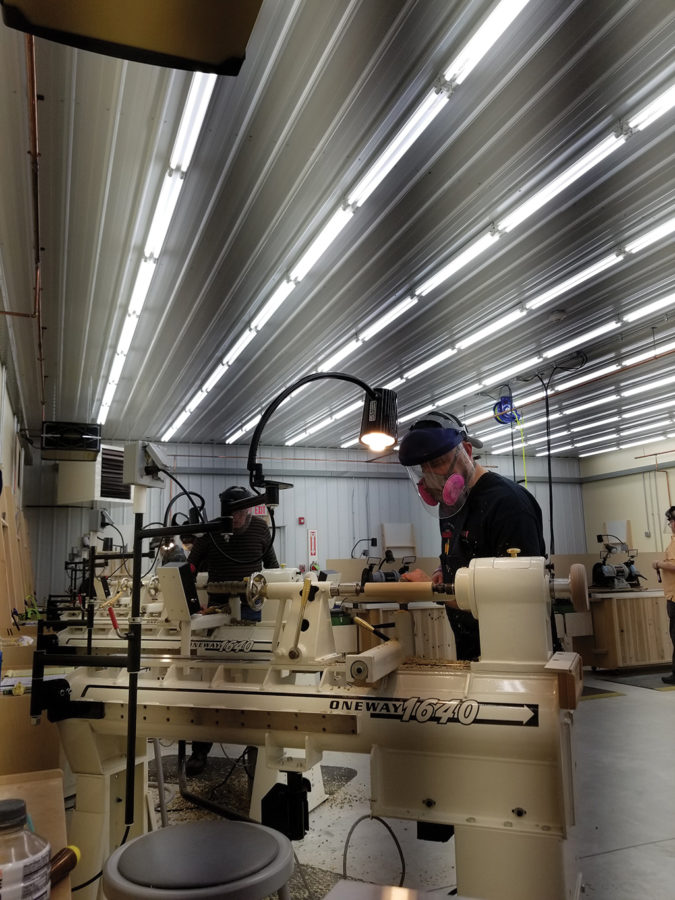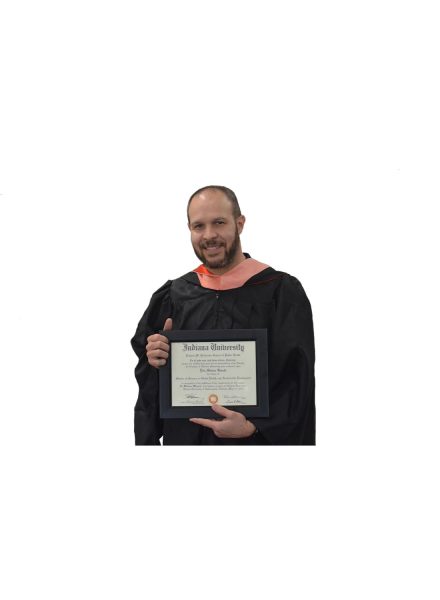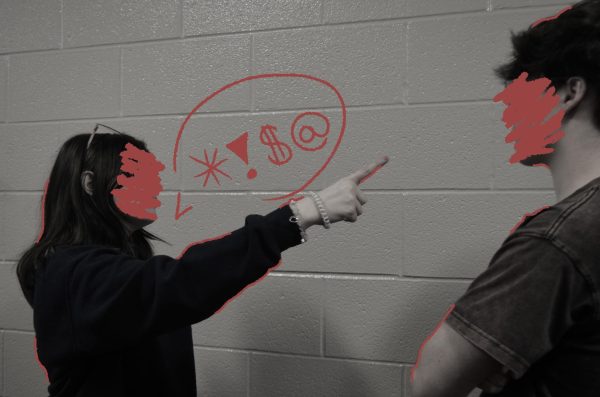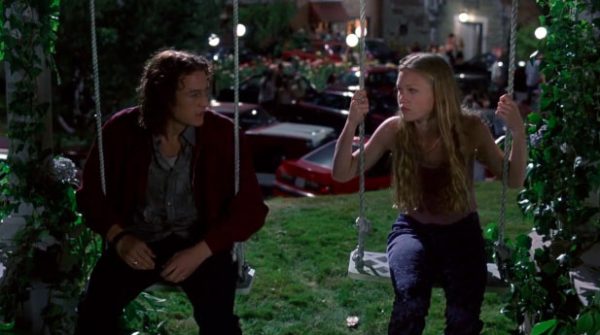October Sixth
May 23, 2018
“I thought I was gonna die.” Words spoken by a teacher who teaches about the human brain, after he found out he had a brain tumor. Irony. An impeccable and concise literary tool used to convey the human condition in a universal way. It translates heavy themes when necessary, while, conversely, lifting the weight of exhausting tragedies with ironic humor. Ah, irony. A respectable and charming quality of life, until our beloved irony manifests itself as a brain tumor in your psychology teachers head.
An AP Psychology teacher, a Macroeconomics teacher, an ex-baseball coach, an avid connoisseur of wood-working, a husband, a father, a fighter. This is only a part of the man that is Michael Rothrock.
Rothrock’s story isn’t about cancer, it’s about the one of a kind human being that he is. But, to best exemplify his rare qualities, we must look through a cancerous lens. The journey began the first semester of 2018.
“One day in class I had what’s called a complex partial seizure and had a summer where I wasn’t able to think or focus,” Rothrock said. “It started [again] this semester, and…started to happen pretty regularly. My ability to think and function in front of class started to go away.”
The diagnosis was a laborious ordeal. A bit of rebellious teamwork between Rothrock and his primary care physician yielded a life saving discovery.
“He tried to get me in to get an MRI,” Rothrock said. “They wouldn’t let me do it because apparently [the symptom of] confusion wasn’t enough. Luckily, I knew there was something wrong. It was more than just confusion. My primary care physician called me and said ‘Hey if they call and ask if you have tendencies for schizophrenia or bipolar disorder, go ahead and say yes.’ He raised my symptoms really, really high so the medical field would let me into an MRI.”
And then the revelation.
“The day before fall break I found out that I had a brain tumor,” Rothrock said. “That was October 6.”
The first person to bear the burden of Rothrock’s news was his friend and fellow social studies teacher, Brandon Swart.
“His doctor called him here at school, I think it was actually during his lunch block, and he came over here and it was shock. I had gotten an MRI before and I was like ‘ya this is what they do it’s no big deal, it’s nothing,’ and for his case it wasn’t. It was actually something.” Swart said.
Despite not having a job here, Rothrock moved to Indiana from Colorado because of his wife’s new job opportunity. His teaching years had yet to find their end.
“I was part of the process of hiring Mr. Rothrock. He was somebody who we knew right off the bat was just going to connect with students,” Swart said. “[His previous] principal actually called us and was like ‘we’re losing him, we don’t want to lose him, but you’d be stupid not to hire him.”
Being a psychology teacher is exactly what has kept Rothrock’s own psychology intact.
“Teaching psychology has made a lot of my approaches to life and things of that nature a little bit different,” Rothrock said. “This is what I do, and teaching is what makes me happy. Just doing my job and being as normal as possible has been important to me.”
AP Psychology student and student assistant of Rothrock, Madalyn Judah, solidifies the inarguably positive opinion of him.
“He’s probably one of the best teachers I’ve had, I’m not gonna lie,” Judah said. “He’s really passionate about his students and he wants them to learn and he’s willing to take the time for each student to learn.”
Part of Rothrock’s happiness comes from woodworking.
“My dad was president of the Hardware Lumber Company. I worked for my dad in the summers in high school and some in college and I stocked lumber for Mark Adams,” Rothrock said.
Rothrock said his passion for woodworking is what keeps him sane.
“[I] started going to these classes and realized that I was building furniture really crappy, and have since really found a good place. For one, the teachers are some of the best in the whole world,” Rothrock said.
While woodworking may seem like a chore to some, Rothrock chooses to practice woodworking because he enjoys it.
“My wife wants to work a little less and spend more time with the children, part of our deal with that is I refuse to do work that doesn’t make me happy. I don’t choose to work to make money. Obviously, I’m a teacher. Woodworkers don’t make a ton either, but it makes me happy.”
Thanks to his lessons in woodworking Rothrock is now able to craft with high standards.
“I can make some pretty beautiful furniture because I know how wood works and how its looks and how to finish it. Am I going to make a beautiful picture, no, that’s not me, that’s not my skill set,” Rothrock said. “That’s my wife, that’s my daughter, that’s not me. But the bench that we’re sitting on, I can make this a much better looking bench in the same structure, because of what I know and the skills that I have to put it together,”
Though he’s gotten right back into the mix, he’s still feeling the effects that come with any brain surgery.
“What’s funny about your temporal lobe is that [it] deals with personality, but not the personality that we know a lot about, that’s in our frontal lobe. And so I’m trying to figure out how to monitor that. Luckily school doesn’t challenge those issues, it’s more dealing with frustration and my patience with my children and just life in general,” Rothrock said.
Family has remained near and dear to him, even more so now when the outcome of his life is in such a state of fluctuation.
“I need to value the time with my family because the other thing that’s hard about this is that the chances are this is gonna come back. What’s hard for me to deal with is I’ve got a pretty good idea of what’s gonna cause the end of this experience,” Rothrock said. “I just don’t know when. Hopefully a really long time from now. But then again who even knows. At this point you could drive yourself crazy thinking about it, but that’s when I stopped and just say well just enjoy the rest of your day and enjoy the people that you’re around and what you’re doing.”
As a result of the mental trials that Rothrock has been through, he’s had to reassess his perspective on faith.
“Has it changed [my] faith and belief etcetera? absolutely.” Rothrock said. “But that’s the reason faith and belief is there, it’s for each person to use in their own experience as necessary as they need.”
Because of his insistence on normalcy and his refusal to see himself as a victim, Rothrock started teaching again only a month after his surgery.
“I had [the tumor] removed December 6, was back home from the hospital December 8, and believe it or not was back at school on January 9 for the first day of second semester,” Rothrock said. “All things considered, I’m okay, I’m good. There are a lot of people who wouldn’t be okay. I have people who constantly remind me that what I’m doing is pretty spectacular and amazing, and I don’t see it that way. I show up and I do my job. I hope that doesn’t sound selfish or self-gratifying, its not. It’s just kind of how I was raised.”
Not only does he do his job, but he does it phenomenally, according to Swart and NHS principal, Jeff Bryant.
“There was no talking him out of it,” Swart said. “I even had a conversation with the principal afterwards. [Bryant said] if he wants to come back he’s earned it. And he did.”
Above all of the tragedies he has encountered–his father’s death from pancreatic cancer, his son’s seizures, Rothrock’s own brain tumor — the man continues to live life to the fullest and pursue the passions which motivate him to indulge in living instead of dying.
“I love all of you dearly, but I need some time away,” Rothrock said. “I need to spend some time with my family. I’m going to spend a great deal of my summer trying to carve how my woodworking passion [and] business is gonna look like with the purchase of our new home, my new current situation and go from there. The goal is to get to December. Whatever December looks like I just want to get there. That means I won’t have to take any more poison. For now. And I just want to get that out of my body.”
The most genuine advice you will receive on how to make the most of your life will come from people who know, first hand, why it is necessary to live, not survive, but live every second.
“To just slow down and smell roses every once in a while and enjoy subtle things. If you want to go do something you’re in a really good place to go do it,” Rothrock said. “Everyone will find their home in some way shape or form, and it might take five six seventy nine ten years of missing it to come back to it but there’s a lot of stuff past 96th street and north of 191st and we should all not be afraid of exploring lots of things.”


